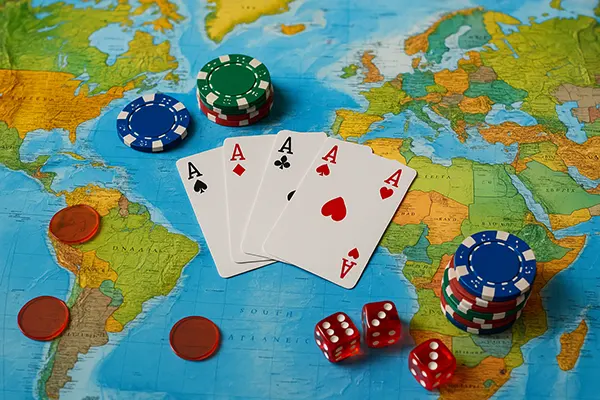
New Alternative Poker Formats Gaining Momentum in 2025
As the global poker scene evolves, 2025 has brought a new wave of formats that reshape traditional gameplay and attract players seeking innovation. From short-deck poker to hybrid online-live tournaments, the poker community is embracing a diverse range of experiences that combine skill, adaptability, and modern technology. These changes are not just about entertainment but also about how strategic thinking and player dynamics evolve with each new variation.
Short-Deck Poker and the Rise of Mixed Games
Short-deck poker, also known as six-plus hold’em, continues to grow in popularity throughout 2025. With a deck reduced to 36 cards, the game alters traditional hand values—flushes outrank full houses, and players find themselves constantly adjusting their strategy. This change leads to faster gameplay and higher variance, appealing to both professionals and casual players who enjoy dynamic action.
Mixed games are also seeing a revival, particularly at high-stakes tables and in online tournaments. Formats combining Texas Hold’em, Omaha, Stud, and Razz within a single event demand broader skill sets and reward true versatility. The trend is especially visible in major series like the World Series of Poker and PokerStars’ online festivals, where mixed-event entries have significantly increased.
The diversity of these games encourages strategic depth and creativity. For many players, transitioning between formats sharpens their adaptability and analytical skills, creating a more balanced and intellectually stimulating poker environment.
Strategic Adjustments in Short-Deck and Mixed Formats
Playing short-deck poker requires recalculating hand ranges and equity. With fewer cards, premium hands appear more often, and aggressive pre-flop play becomes standard. Post-flop decisions hinge heavily on board texture, as drawing odds shift significantly compared to full-deck Texas Hold’em.
In mixed formats, understanding each game’s rhythm and betting structure becomes crucial. Transitioning smoothly between fixed-limit and no-limit variants challenges even experienced players. Those who excel tend to use pattern recognition and exploit opponents unfamiliar with specific games in the rotation.
Ultimately, success in these formats depends on mastering versatility. Players who study transitions between game types and practice quick adaptation gain a clear competitive edge in modern poker tournaments.
Hybrid Tournaments and Fast-Fold Innovations
Hybrid poker tournaments have become one of the most exciting developments in 2025. These events combine online qualification rounds with live final tables, often hosted in prestigious casinos or televised studios. Platforms like GGPoker and partypoker have implemented secure hybrid systems allowing players to compete globally, reducing travel costs while preserving the excitement of live competition.
Fast-fold or “zoom” poker formats continue to thrive as well, catering to those who value constant action. Players are instantly moved to new tables after folding, dramatically increasing the number of hands played per hour. This structure has become a favourite among grinders and analytical players who optimise volume and variance management.
These innovations also make poker more accessible. With hybrid events bridging the gap between online and live play, even smaller markets have begun hosting international finals, expanding global participation and diversity in the professional circuit.
Changing Player Behaviour and Game Speed
The introduction of hybrid and fast-fold formats has changed how players approach bankroll management and time efficiency. The ability to qualify online and compete live for major prizes attracts newcomers who might not otherwise join large events. For professionals, these formats provide consistent volume without the fatigue of travelling from city to city.
Strategically, the pace of zoom poker demands precision and quick thinking. Players must rely on population tendencies rather than detailed reads, pushing the metagame toward mathematical and data-driven approaches. Analytical software and AI-assisted tracking tools play a larger role than ever before.
As a result, poker in 2025 balances traditional psychology with statistical precision. The modern player profile values adaptability, multitasking, and digital literacy alongside classical reading skills and table awareness.

The Future of Alternative Poker Formats
Looking ahead, poker organisers and platforms continue to experiment with hybridised rules and technology. New tournament structures integrate real-time leaderboards, dynamic blinds, and cross-game achievements to keep audiences engaged. Esports-style broadcasts are also gaining ground, turning poker into a more interactive spectator experience.
Regulated markets across Europe and North America are also embracing these new structures, recognising their potential to attract younger audiences. Educational initiatives and transparent random number generation systems reinforce player trust and sustainability within the evolving ecosystem.
As the poker world progresses, the line between traditional and digital play continues to blur. These alternative formats are not just temporary trends—they are reshaping the identity of the game itself, ensuring that poker remains a living, evolving form of competitive strategy for years to come.
Major Series Embracing New Formats
In 2025, major series such as the World Series of Poker, Triton Super High Roller Series, and EPT have adopted new divisions featuring short-deck and mixed formats. Online operators like GGPoker, Winamax, and 888poker also host hybrid championships that culminate in live finals, bringing together players from around the globe.
These events demonstrate a shared vision between organisers and the community: keeping poker fresh while maintaining its strategic core. By integrating technology and tradition, they ensure that the game’s complexity continues to evolve with modern preferences.
Ultimately, 2025 marks a defining year for poker innovation. The blend of formats, accessibility, and player-centric design ensures that the spirit of competition thrives, appealing to both professionals and enthusiasts worldwide.






